
Licensing Career Stories: Nat Milburn
Nat Milburn is Vice President, External Business Development at Newell Rubbermaid Inc.
How did you come to licensing as a career?
Like many people in this industry, licensing came to me as a career rather than me seeking it out. I was an economics major in college, and was fascinated with the rapid growth of Japan’s economy and the culture there. I then went to Japan to get a degree in Japanese language and culture. While abroad, my professional journey began, working for a small consulting firm helping U.S. companies expand into the Japanese market.
After returning home, I got a job doing similar work for a small international law and consulting firm, Blumer International Group in Atlanta, Georgia. One of the projects I worked on there was with a Japanese client interested in a technology license from a Swiss-based recycling company. Thus the word “licensing” was added to my resume as an adjective explaining one of several projects I had done.
A friend of mine was in Human Resources at The Coca-Cola Company and offered to scan my resume into their resume database. Without a specific job in mind, and no real prospects at Coke for former consultants, I had very low expectations of ever hearing from them. More than a year later and now focused on moving to a larger consulting firm, I received a call from HR at The Coca-Cola Company. Their Worldwide Licensing Department was looking for someone to grow their trademark licensing business in Japan and throughout Asia Pacific, Middle East & Africa. Two key words were used to search Coke’s global resume database: “Japanese language” and “Licensing”. Nine months and many, many interviews later, my “licensing career” was born as a Regional Licensing Manager in Coca-Cola’s licensing team.
Licensing is a very broad field. How would you describe the area of licensing that you work in?
The External Business Development team at Newell Rubbermaid has the pleasure of working in a variety of areas. The methods used by our Global Business Units to Build Brands That Matter™ are diverse. Our team serves our GBUs when those methods involve intangible assets shared between us and an external firm. We transfer brand assets and technology assets in and out of the company.
Most often, the type of legal instrument used takes the form of a license agreement. However, that is not always the case – hence the reason for removing the word “Licensing” from the name of our function. Our role is to ensure the long-term success of relationships between our GBUs and their external partners.
What is your favorite part of your job?
My favorite aspect of my job is the growth I experience when I listen to my team. My career has been so much fun, it is difficult to choose a “favorite aspect.” For me, I guess it is the chance to learn about a breadth of industries, business functions, and types of thinking that make up this industry. If you love learning and personal growth, licensing offers so much.
What’s the most challenging aspect?
Communication: Getting people to think innovatively about this business model and its applications beyond “logo or character slapping.” As practitioners, we must strategically reframe the discussion within the marketing sciences about our industry.
What are some trends or changes that you have noticed in the licensing industry in recent years?
The significant trends are different depending on whether you are talking about brand assets or technology assets. However, the general trend I see is in the approach to relationship development. New deal structures are evolving that improve the likelihood of long-term relationship success. Attorneys in our industry are finding more creative ways to get deals done to meet the needs of more collaborative partnerships while also protecting intangible assets. Recent innovations in deal structures are an often over-looked improvement slowly taking place in the licensing industry.
What excites you about the future of this field?
Wall Street is gaining a deeper appreciation for the various ways intangible assets create value for corporations like those within the LIMA membership. This is resulting in increased focus in the C-suite on improving the management of intellectual assets for maximum value.
Once we practitioners learn to translate our “licensing speak” into the language of the boardroom, we will see a significant and dramatic improvement in the value our teams can add to our businesses. Thereby increasing demand for our skills and capabilities.
Can you share some advice or give some perspective that would be beneficial to students or young professionals wanting to pursue a career in licensing?
Our industry grew out of the legal function, and hence got its name from the type of agreement used. It is time, I believe, for this to change. Hence, don’t use the word licensing to describe what you do, unless you are specifically mentioning a type of legal instrument. This is true even for attorneys. Marketing and Finance are the languages that will enable the value of what we do to be best articulated to senior management. Our language should emphasize building brands, not the type of legal agreement used to do it.
Any advice for mid-career professionals looking to expand their competencies?
Seek the advice of someone doing the job two levels above where your next move would be. Everyone has climbed from exactly where you were standing. Seek their advice, not a job. Then, “pay it forward.”

















